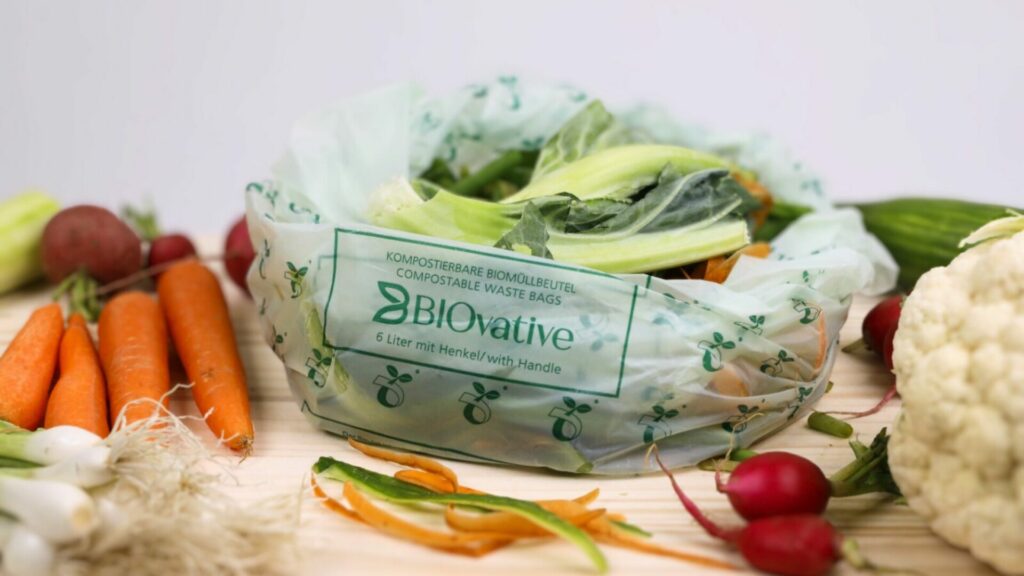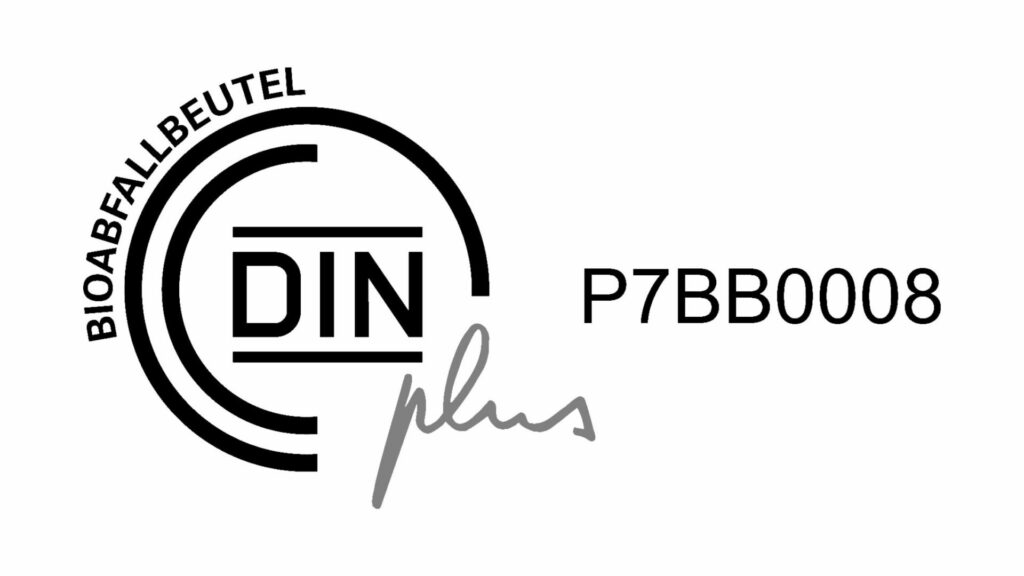BIOvative Magazine » DINplus organic waste bag certification – for a clean organic waste bin
DINplus organic waste bag certification – for a clean organic waste bin
DINplus organic waste bag certification – for a clean organic waste bin
- 23. January 2025
- Autor: Janine Friebel
- Lesezeit: 9 Minuten
Organic waste bags labelled with this DINplus ‘organic waste bag’ certificate not only keep your organic waste bin clean. These bioplastic waste bags can also be fully composted in composting plants within six weeks. This means that with the latest amendment to the German Biowaste Ordinance, there is almost nothing standing in the way of their use in your domestic organic waste bin.
The DINplus biowaste certification at a glance
Key message of the DINplus biowaste bag certification
The ‘DIN plus biowaste bags’ certification system was developed by DIN CERTCO and limits the time that compostable biowaste bags are given to decompose to a maximum of six weeks. This is only half the time allowed by the European standard DIN EN 13432.
The DINplus biowaste bag certification has these advantages for you
The certificate
- serves as a quality criterion for biowaste bags.
- certifies that the biowaste bag is biodegradable and compostable.
- also qualifies biowaste bags for use in domestic organic waste bins because the maximum rotting time is six weeks.
Requirements for DINplus biowaste bag certification
- The biowaste bag undergoes chemical characterisation, in particular testing for heavy metals and toxic substances.
- A test for complete biodegradability is carried out.
- Disintegration under industrial composting conditions after a maximum of six weeks is checked.
- The quality of the compost is also determined. Above all, this includes an ecotoxicity test on two plant species.
- Testing is also carried out under an infrared spectrum.
- If necessary, earthworm toxicity is also tested if the AS 4736 standard applies.
Differentiation from other certificates
Certification bodies
- DIN CERTCO (TÜV Rheinland)
Certificate
Examples of products with the DINplus biowaste bag certification
The DINplus biowaste bag certification in detail
The DINplus organic waste bag certification was commissioned by the Association of Compostable Products. The seal was developed by DIN CERTCO, part of TÜV Rheinland. The purpose of the certificate is to indicate that organic waste bags with this certification can also be decomposed in composting plants by waste recyclers and can therefore be used for waste disposal in the organic waste bin. For this reason, the DINplus ‘organic waste bag’ certificate only applies to organic waste bags and not to other biodegradable containers such as food packaging.
We have summarised exactly what it means when products are biodegradable in our article ‘Biodegradable, compostable, biobased, recyclable – meaning and difference’.
Compostability in accordance with the DINplus ‘Bio-waste bag’ certificate
Biowaste bags are considered compostable within the meaning of the DINplus ‘biowaste bag’ certification if they are decomposed in an industrial composting plant at temperatures of at least 60 to 65 degrees within six weeks. After sieving through a sieve with a 2-millimetre opening, a maximum of 10 percent of the original biomass may remain.
The DINplus ‘organic waste bag’ certification serves as a supplement to the DIN 13432 and DIN 14995 standards and is only awarded if the maximum decomposition time of the organic waste bag is no more than six weeks and the other test requirements that also apply to the ‘Keimling’ are met.
This means that the Keimling and the DINplus ‘organic waste bag’ certification are congruent in their test requirements except for the rotting times. While products with the Keimling must be compostable within 12 weeks, the maximum composting time for DINplus certification is halved to six weeks. You can find out more about the test requirements for the Keimling in our article: ‘This is what the “Keimling” is all about: DIN standard EN 13432’.
Test specifications behind the DINplus biowaste bag certification
The certification is based on the requirements of DIN 13432, which are also necessary for the award of the Keimling label. The DINplus ‘organic waste bag’ certification only goes beyond the requirements of the Keimling in terms of the rotting time: the maximum rotting time of the organic waste bag is halved from 12 to a maximum of six weeks.
As with the Keimling, no more than 10 per cent of the original biomass may remain after a maximum of six weeks of composting if the compost is sieved through a sieve with a 2-millimetre opening.
In addition, complete biodegradability must be guaranteed within six months. This means that the product must decompose to carbon dioxide, water and a maximum of 10 per cent of its biomass within six months.
With regard to pollutants and possible toxicity tests, compliance with the limit values specified in DIN 13432 applies.
Other standards that can be used for testing are
- DIN EN 14995: ‘Plastics - Assessment of compostability. Test scheme and specifications’
- ISO 17088 ‘Specification for compostable plastics’
- ISO 18606 „Verpackung und Umwelt - Organisches Recycling“
- AS 4736 „Biologisch abbaubare Kunststoffe - Biologisch abbaubare Kunststoffe, geeignet für Kompostierung und andere mikrobielle Behandlung“
Practical implementation of the DINplus biowaste bag certification in disposal
In February 2022, the Federal Council passed an amendment to the Biowaste Ordinance that contains an important change for you: With effect from 1 November 2023, waste bags made from bioplastics that have been tested and labelled in accordance with the DINplus biowaste bag certification will no longer be considered foreign matter in the organic waste bin. This means that you may use these biowaste bags to line the organic waste bin and as organic waste bags in the organic waste bin. This is subject to a number of conditions laid down in the amendment.
- The most important prerequisite: The local waste disposal company has authorised the use of these biowaste bags in its area of responsibility in accordance with the Biowaste Ordinance.
- The biowaste bag must also fulfil the requirements of the DINplus biowaste bag certification.
- In addition, the waste bag must be made from predominantly renewable raw materials.
- Last but not least, the bag must be clearly labelled by the manufacturer with the green Keimling and an indication of the permitted use.
The prerequisite that you need to clarify: Check the waste disposal statutes of your local public waste disposal organisation! If they allow the use of appropriate biowaste bags, you can use them for the organic waste bin without any problems.
In practice, the disposal of biowaste bags with DINplus certification is unfortunately not so easy. In discussions with many disposal companies, it becomes clear that many disposal companies do not seem to be aware of the difference between bioplastics and plastic.
And this is currently our mission as BIOvative: we are doing educational work on the subject of bioplastics and organic waste. We are in dialogue with various composting plants and waste disposal companies. In this way, we want to ensure that the amendment to the Biowaste Ordinance is also implemented in your district.
So check carefully whether you are allowed to dispose of the biowaste bags in your local organic waste bin. They are definitely suitable for the clean collection of your waste in the kitchen and garden and you avoid unnecessary additional plastic waste!
Collect organic waste cleanly and with a clear conscience with DINplus certification
An example of an everyday product with the DINplus ‘organic waste bag’ certification are the compostable organic bags from BIOvative. They are made from renewable, European raw materials and produced in Germany. This means that they are not only regional, but also fully compostable and biodegradable.
In addition to the DINplus ‘organic waste bag’ certification, they also bear the OK Compost HOME seal and the ‘Keimling’ label.
Always stay up to date: To make sure you don’t miss any news from BIOvative, sign up for our newsletter and follow us on social media!

Janine Friebel





